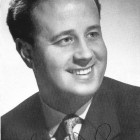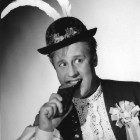Murray Dickie Suggest updates
Murray Dickie, OBE.
Born Bishopton, Renfrewshire, 3 April 1924.
Died Cape Town, 19 June 1995.
Scottish tenor.
Murray Dickie enjoyed a notable career as a performer of character roles at Covent Garden and Glyndebourne, before he was encouraged to move to Vienna. There he spent the rest of his singing career, which lasted some 35 years. The award of the Austrian title Kammersänger was followed by the Cross of Honour for Arts and Science.
Murray Dickie was the younger brother of the baritone William Dickie (1924-1984), and his son John Dickie (1953-2010), who grew up in Vienna, also had a successful career as a tenor.
Early career
After war service as a seaman, Murray Dickie was engaged, along with his brother, as a member of Jay Pomeroy's New London Opera at the Cambridge Theatre. The artistic director of this company was the retired tenor Dino Borgioli, and Dickie was able to study with him and (in Milan) with Guido Farinelli before making his debut in 1947 as Almaviva in Il barbiere di Siviglia. His brother was also making his London debut as Figaro. Ian Wallace was the Bartolo, conducted by Alberto Erede.
Royal Opera House
In 1949 Murray Dickie moved to Covent Garden. His roles at the Royal Opera House included Mozart (Don Basilio and Tamino). With Sir Thomas Beecham he sang David in Die Meistersinger, a role which he would sing all over the world, and Florestein in The Bohemian Girl, which he wouldn't. He created the part of the Curé in The Olympians (Bliss 1949). Roles at Glyndebourne from 1950 included more Mozart (Pedrillo) as well as Brighella in the Edinburgh staging of the original version of Ariadne auf Naxos (also under Beecham). When the staging was revived with the Prologue he added the Dancing Master.
Dickie sang at the Vienna Staatsoper in 1952, and was invited to move there as a permanent member of the company. His many roles over the years included David, Jacquino, Pedrillo, Don Basilio, Valzacchi (Der Rosenkavalier), and Andres (Wozzeck). From then his appearances in Britain became rare. He was able to make occasional visits abroad, including Buenos Aires. He sang David in Barcelona and, in 1962, for his debut at the New York Met.
In the late sixties he travelled to Scotland to appear as a guest in a series of programmes presented for Scottish Television by Ian Wallace, an old friend and colleague from the Pomeroy and Glyndebourne days. Called Singing For Your Supper, this was an entertaining general introduction to opera broadcast on Sunday afternoons.
In later years Murray Dickie took up direction. He worked in London on one occasion, in 1976, translating and directing a new version of the little-performed Johann Strauss operetta A Night in Venice at the Coliseum, at which point the OBE was awarded. After retirement from singing, he moved to South Africa, becoming director of the CAPAB opera company in Cape Town.
Recordings
He made several recordings, including, in Vienna, classic accounts of Le nozze di Figaro and Der Rosenkavalier conducted by Erich Kleiber. In Karl Böhm's first recording of Die Frau ohne Schatten he sings the One-Eyed Brother. He repeated Valzacchi on disc when Sir Georg Solti made his recording of Der Rosenkavalier. Shortly after that, in 1971, he recorded the role of the comic glutton Iro in Monteverdi's Ritorno d'Ulisse in Patria, conducted by Nikolaus Harnoncourt. One famous non-operatic recording is of the tenor solos in Mahler's Das Lied von der Erde, usually the preserve of more dramatic voices. His colleagues on this version are the baritone Dietrich Fischer-Dieskau and the Philharmonia conducted by Wilhelm Furtwängler.
Roles in Scotland
- Don Basilio a priest and music master
-
Nozze di Figaro 1950
- Brighella a comedian
-
Ariadne on Naxos 1950
Ariadne on Naxos 1954
- Sellem an auctioneer
-
Rake's Progress 1953
- Dancing Master
-
Ariadne on Naxos 1954
- Father
-
Seven Deadly Sins 1961

